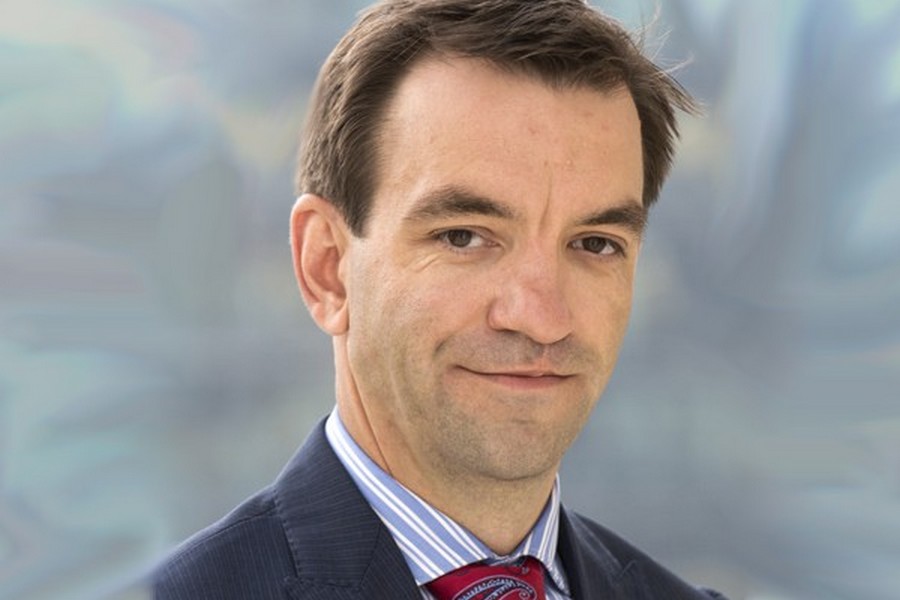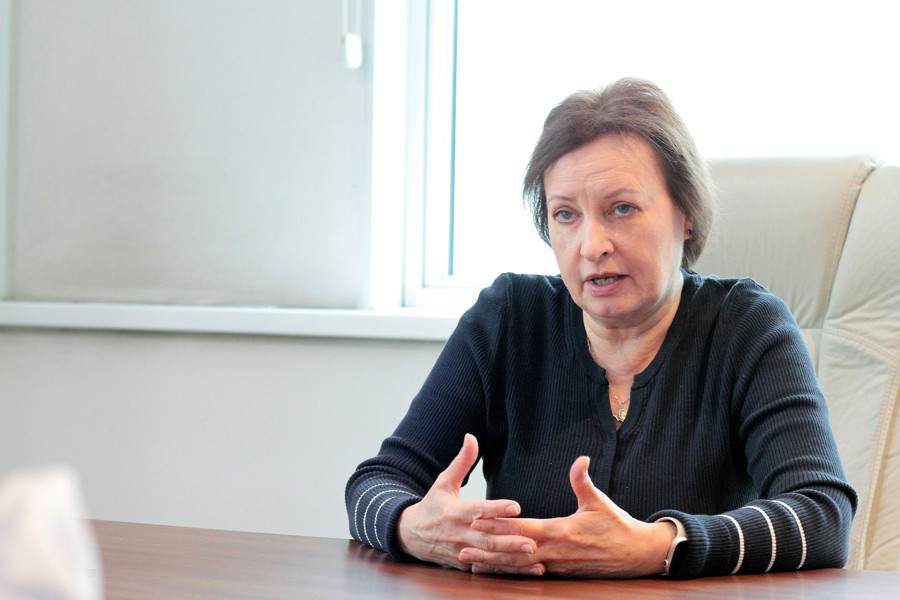EBRD Director for Kazakhstan Agris PREIMANIS:
DESPITE THE PANDEMIC IN KAZAKHSTAN THERE IS A LOW DEMAND FOR ANTI-CRISIS ASSISTANCE

Kazakhstan, like the whole world, is living in pandemic mode for the second year. If last year most of the enterprises were forced to stop production as a matter of fact, then this year business has adapted and is working as planned in compliance with all necessary sanitary standards. Despite difficulties Kazakhstan’s companies still need investment rather than anti-crisis funding. Agris PREIMANIS, director of the European Bank for Reconstruction and Development (EBRD) for Kazakhstan, talked about the bank’s priorities and interests in Kazakhstan in an interview with Interfax-Kazakhstan.
- Talk us through the EBRD’s work in the municipal sector. Why is this industry of interest to the major international development institution?
- The municipal sector is extremely important to us in Kazakhstan. We understand that the quality of municipal services ultimately influences the quality of life of Kazakhstani residents in all the regions of the country. We are also well aware that the sector requires serious modernization and investment. A sizeable portion of it was built a very long time ago and has a high level of wear and tear. This is not just a formal issue, it affects the quality of life of people.
We have been dealing with this for 10 years and seeing the opportunities and real results of work we have been doing jointly with the government and [regional] administrations . We are very pleased with long-standing understanding and support from the central and local authorities.
At the moment we have already funded 26 projects, these are various areas - transport, water and heat supply, electricity. It is exciting to have these projects all over the country. Eleven cities are involved, including Aktau, Aktobe, Kostanai, Kyzylorda, Nur-Sultan etc. The budget of projects in the municipal sector, in which we have participated for 10 years, totals 285 billion tenge (424.32 tenge/ $1), of which the EBRD’s loans are 206 billion tenge, the rest is contributions from government budgets, administrations and the companies themselves.
Speaking specifically about projects, it is worth talking about the upgrade to the heat supply system in Kostanai, which was put into service in 1948 and since then it has not seen so many upgrades . We started the project in 2016, a loan from the EBRD amounted to 3.7 billion tenge, Kazakhstan provided 1 billion tenge and the local administration 1.17 billion tenge. In addition to the loan, the EBRD provided a grant of € 730,000. This is an important part of our projects, where we not only provide loans, but also provide grants that are used for the project preparation and implementation, obtaining alternative practices and so on.
As a result of the project implementation the energy output increased, heat losses decreased, consumption meters were installed , which 90% of consumers are already using, there are serious improvements in terms of financial indicators.
Another important project is the tram project in Pavlodar, which we started in 2015. The budget amounted to 3.9 billion tenge, of which 2.5 billion tenge came from the EBRD.
When we started there were 104 trams in the city, and only nine of them did not pass 18-year service life . As a result, the city purchased 23 new energy efficient low-floor trams. Together with my colleagues from the administration I went by tram, its quality is the same as in any European city. We also helped with the installation of rails, which significantly reduced the noise level in the city. At the moment, trams carry 40% of traffic in the public transport market that operate in any weather, which is important for such a northern city. 42,000 passengers are using trams every day, 15.5 million passengers per year.
- What share in your portfolio do municipal projects account for?
- Our total portfolio nears $ 3 billion, of which municipal investments account for 12%. The fact that we have already completed 26 projects is very important for us. A fairly large part of our team works on these projects, because preparations for them are usually more extensive than with private companies. A large portion of work is carried out during the institutional preparation of companies and administrations, especially if we work with them for the first time - they need to understand how to work with international organizations, credit facilities, what kind of reporting and auditing is needed. I consider this to be an important part of the positive results of the EBRD’s program in the municipal sector. On the one hand, we are talking about receiving high-quality services, on the other hand, through training in interaction with the international institution, understanding and financial literacy get improved at all levels.
- Let's go away from the municipal sector. In May you signed an agreement with Yildirim Group on the allocation of $ 15 million for Voskhod-Oriel LLP and Voskhod Chrome LLP in Aktobe region regarding short-term liquidity. Is this a one-off event or are you planning to provide funding to secure short-term liquidity for other enterprises in the mining sector? How pressing is the short-term liquidity provision issue for these enterprises?
- Yildirim Group is our long-term client in Kazakhstan, we had have long-term successful cooperation with them. The project, you voiced, arose in order to maintain the company activity, we quickly implemented it as part of our anti-crisis programs. No other plans are being elaborated with Yildirim Group and other mining companies.
- Has the EBRD received requests from other entrerprises to support in providing short-term liquidity?
- In the mining sector nothing has been concretely elaborated on . Usually such projects are implemented with existing clients. As for the plans for this year, I would say that the demand for working capital was relatively low in comparison with other countries. We saw what was happening in many countries, prepared for this and since the beginning of the crisis we have created a mechanism that allows us to issue funds more quickly - instead of six month-long approvals we can issue money in two months or even faster. But in comparison with other countries the demand for anti-crisis assistance in Kazakhstan was not very high both during the crisis and now . We are finishing off several projects, but this is not the main part of what we are doing in the country. Still, most of projects planned for 2021 are investment ones: on establishing and building up enterprises. There are such interesting dynamics in Kazakhstan in comparison with other countries.
- Last year during the pandemic the EBRD provided a total of $ 925 million to support the economy of Kazakhstan. Is similar assistance planned for 2021?
- I would like to clarify that the $ 925 million include syndicated loans. Last year, the largest project was BAKAD [Big Almaty Ring Road], a unique project for Kazakhstan and Central Asia. If you look at most of last year's projects, they are mostly investment projects, not anti-crisis ones. This year the dynamics are approximately the same, our priorities by sector remain, they reflect Kazakhstan’s economic trends. Most of investments will go to infrastructure and energy, the green topic is very strongly outlined: airport, motor roads, renewable energy sources, municipal projects. At the same time we do not forget about small and medium-sized businesses (SMEs), this is work through second tier banks. A number of projects is planned with Bank CenterCredit, where we provide money to SMEs and for the development of the Women in Business program. We have also added a very interesting program, where we provide funds to the bank for issuing loans to SMEs for ‘green’ purposes. I am very proud of this new program and we plan to expand it this year.
- Talk us through the implementation of the project, where $ 80 million is allocated for environmental purposes for the Atyrau Oil Refinery (ANPZ). Are there any plans for similar eco-projects in the western region, for example, like the Astrakhan-Mangyshlak water pipeline modernization?
- I believe that the project we have agreed on will significantly change the quality of life and ecology in the region. These are new treatment facilities, greenhouses. I think in the near future the city households will feel the difference. In Atyrau region there is a number of projects financed by us, for example, the highway from Atyrau to Astrakhan, the bypass around Atyrau, intensive work is underway with SMEs in the region. But this is the first environmental project that is significant for us. Though there are no good projects in the pipeline yet, I am sure that on the basis of this ANPZ project we will expand our work on environmental projects in the region in the next year or two.
- Regarding the Almaty airport, in December 2020 it was reported that the EBRD’s Board of Directors approved $ 229 million in financing. At what stage of implementation is this project?
- Most importantly, I am sure, the project will come true . We are in the final stages of agreement. This summer the final signing and disbursement of funds is scheduled - this is a purely technical issue. As the reconstruction and construction of the new terminal progresses, funds will be provided. I am very glad that the project is in progress. The project is being finalized and for now the project is in the same configuration as planned.
- Have you been approached with a proposal to take part in financing the second stage of the Saryarka gas pipeline construction? How attractive is the gas distribution infrastructure development area for you?
- The gas distribution infrastructure development topic is of interest to us. Given the change in the general stance of many developed countries on gas and possibility of financing such projects, it becomes more difficult for us to finance this industry, but opportunity still remains. We continue to discuss the Saryarka [project] and also TETS-2 [thermal power plant] in Almaty, as well as other gas distribution projects in the other regions with the Energy Ministry. Of course, we continue to work with KazTransGas, but it is too early to talk about concrete projects that are in the pipeline.
- Thank you for the interview!
August, 2021
© 2026 Interfax-Kazakhstan news agency
Copying and use of these materials without reference to the source is prohibited
Archive





